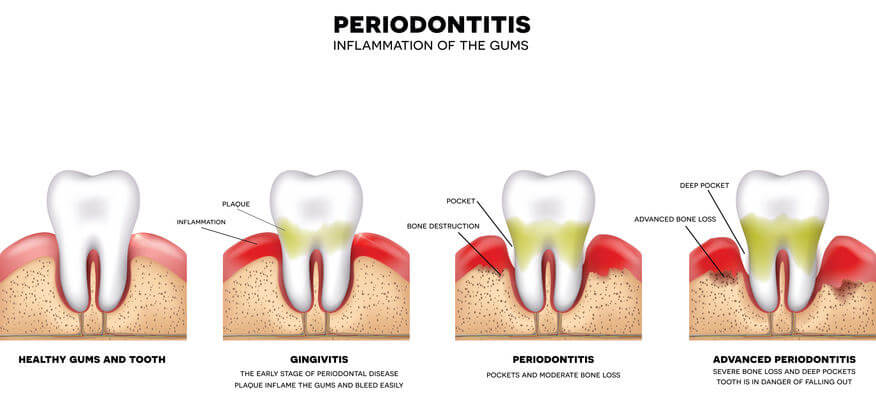Periodontics FAQs
A list of commonly asked PeriodontiCS questions
Periodontists are dentists best known for the prevention, diagnosis, and treatment of gum disease. Periodontists also receive extensive training in dental surgery (extractions), dental implants (including dentures), crown lengthening, and bone & gum grafts. Periodontal treatment can be used to arrest disease, improve a patient’s mouth cosmetically, or both. Our Periodontists can even eliminate cold sores safely and effectively with laser treatment.
Periodontics FAQs
Gingivitis is a long-term infection where bacteria attacks the soft tissue of the gums. It can cause inflammation, bleeding, some discoloration, and relatively minor discomfort. Because it can be subtle, many people do not realize they have a problem. It may take months or even years to develop into an infection that is considered a medical emergency.
Periodontal disease happens when bacteria colonize the gums, beginning with the gum-line where the soft tissue meets the teeth. To protect dental health, these bacteria must be disrupted every day through brushing and flossing.
When they settle on the teeth, bacteria colonies cause a sticky film that develops into plaque. The process of periodontal disease is similar, but it attacks the soft tissue that supplies blood flow to the teeth.
This can cause painful lesions on the gums, loose teeth, and even loss of bone structure.

It is important to have regular checkups with your dentist so they can check for signs and symptoms of periodontal disease. We tell our patients to look for warning signs such as:
- Swollen, red, sensitive, painful or tender gums
- Loss of gum tissue around the teeth
- Increased space between teeth
- Bleeding from gums
Pay attention to changes in your teeth or gums and if something seems to have changed contact your dentist or periodontist as soon as possible. It’s always better to evaluate and diagnose quickly, as symptoms are often overlooked and periodontal disease can progress quickly.
Gum disease is the outcome of gingivitis when it is not treated. It is also called periodontal disease. It is a very serious infection that not only endangers the mouth’s soft tissue but can directly attack the jaw bone. All the symptoms associated with gingivitis become much worse once the disease progresses this far.
It may be possible for the bacteria that cause periodontitis to be passed through contact with infected saliva. Common infection scenarios include parent-to-child transmission and transmission between romantic partners. As a result, it is important to avoid contact with the saliva of anyone you know to be infected and to avoid sharing a toothbrush with anyone, no matter how well you may know them.
With prompt treatment, it’s possible to protect teeth. Even teeth that have serious underlying damage can often be repaired or replaced with a dental implant. Quick action is key; if untreated, the disease can ultimately wear away the bones of your jaw.
Periodontal disease starts when bacteria and tartar are built up under the gumline. The increase in bacteria will lead to an infection that can cause gums to be inflamed and swollen. Areas of infection will form between the teeth that are hard to remove. Periodontal disease can cause bone damage and tooth loss if left untreated.
- Gingivitis – The mildest form of periodontal disease is gingivitis. During this stage, plaque inflames the gums and causes them to bleed easily. Sometimes there are no symptoms and often gingivitis can be reversed with regular brushing, flossing, and dental cleanings every 6 months. If gingivitis is untreated it can progress to periodontitis.
- Periodontitis – During this stage, inflammation and infection may spread from the gums and teeth into the bone that supports the teeth. Gums may recede, pockets may become more apparent and it may be hard to keep those areas clean. The symptoms are more apparent and swelling ligaments may break down and large pockets and moderate bone loss may occur.
- Advanced Periodontitis – As periodontitis progresses, pockets can be deeper and severely infected. Pus may be present and gums may be swollen. Sensitivity may be experienced with hot or cold, brushing teeth may cause pain, and teeth may become loose. Removal of teeth may occur in order to stop the disease from spreading.
Scaling is a special type of cleaning treatment for those with mild to moderate stages of periodontal disease. Your hygienist will use special instruments and take care to clean not only all surfaces of each of your teeth, but under your gums as well, removing all harmful bacteria. This is typically done in multiple visits for the comfort of the patient.
Your questions and concerns are important to us and our team will work with you very closely to help make your procedure a success. Please give our office a call to schedule your initial consultation. We will also discuss fees and insurance during your visit. There are many types of insurance plans, and coverage for implants varies. We will be happy to assist you in obtaining any benefits to which you may be entitled.
Patient Information
We encourage new patients to fill out a new patient form online prior to your first appointment. Be sure to select the appropriate location for your new patient forms, as once you complete them, they are sent electronically to the office you’ve chosen.
Insurance
Medical and dental insurance can be confusing. Our staff has experience with your questions and can help you get the most from your insurance.
No insurance? Apply today.